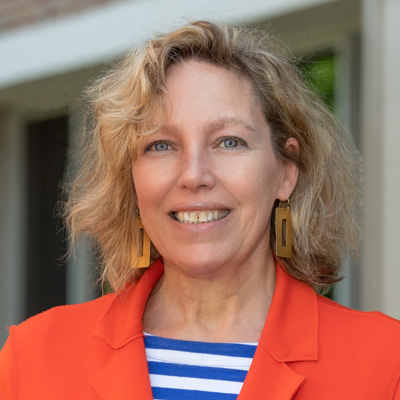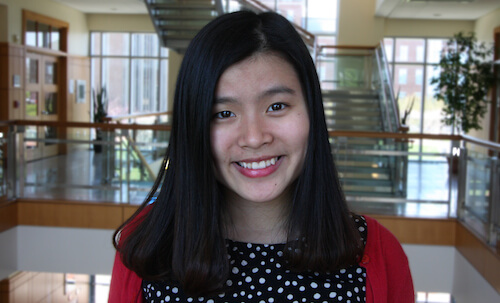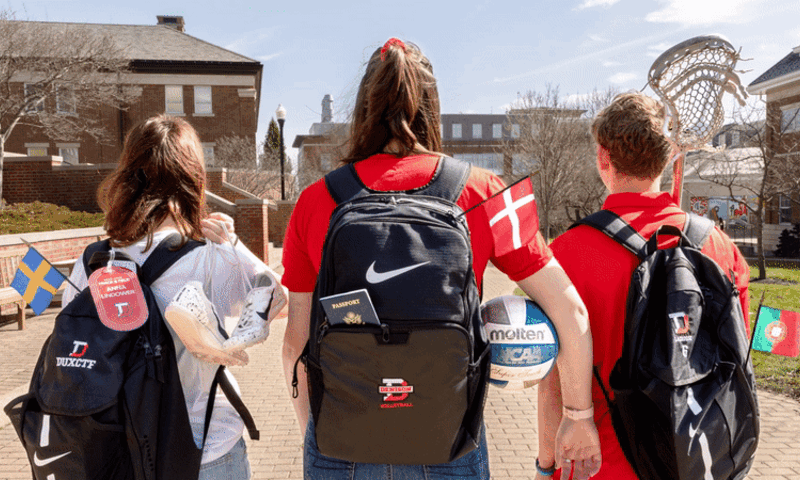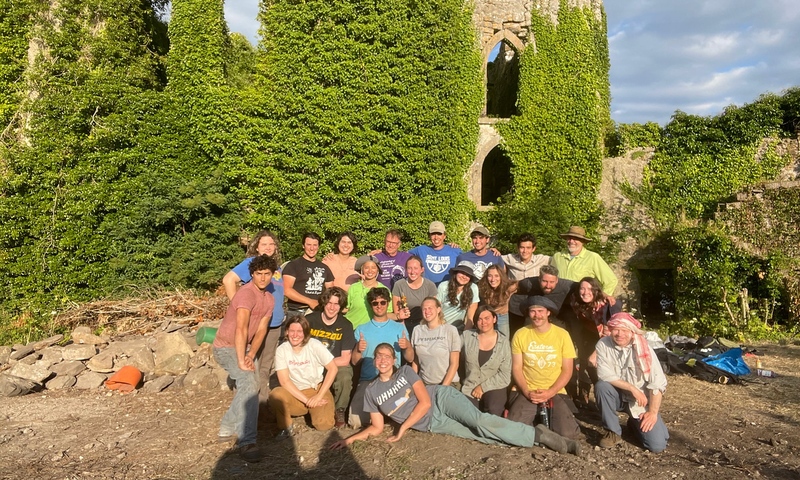Navigating new environments isn’t easy – and it’s especially challenging for international students, who are heading to college for the first time as well as entering an entirely new culture.
Chi Nguyen ’17, an international student from Vietnam, has first-hand knowledge of how complicated even the simplest things can be.
For instance, when you’re invited into a Vietnamese home for a meal, you are encouraged to eat — a lot. And the host and hostess will even go so far as to put food onto your plate to make sure you taste everything. “That’s a very welcoming thing to do in Vietnam,” Nguyen says with a smile. “But here in the U.S., if someone would put food on your plate, that might be considered rude.”
Homesickness is on a different scale as well. International students might only visit home once a year. And due to the cost of the flight home, often time between visits to home and family must stretch even longer.
“I was with several friends, talking about fall break and one of my U.S. friends was sad that she couldn’t go home until Thanksgiving break, which felt like such a long time to her,” says Nguyen. “For us international students even going home every year can be considered very lucky.”
Every student is responsible for tuition and living fees, and many work-study programs help students afford college. Most international students also work and use those funds to help pay for tuition and their living expenses, and the additional cost of their airfare back home.
At Denison, international students can work up to 20 hours per week. Students may feel an underlying expectation to work all those hours to pay for those extra expenses. This can create an internal pressure to work extra hours also takes away from study time and free time with their friends.
Of course, all this can be taken in stride, and hundreds of international students do each year. But next comes the question about what happens after Denison — and how to find those important internships that can lead to employment in the U.S.
Student visas allow students to work at the college and to get a summer internship that is aligned with their major. In order to engage in an internship, international students must show that the internship is a requirement of their major or that they are able to earn credit in conjunction with the internship.
There is an additional hurdle. “I’ve applied for many internships and in almost every job application is a question that I know by heart: ‘Will you now, or at any point in the future, require sponsorship to work?’” says Nguyen, who is majoring in economics and environmental studies and minoring in psychology.
“I find that my applications for summer internships are rejected even when I am well qualified for the work,” she continues. “Last summer, before an interview for my preferred internship, I received an email from the recruiter saying that he really liked my experience. And then he asked if I have permanent residency. After I said ‘no,’ the interview was canceled.”
“My friends always ask me why I spend so much time looking for summer internships. But I know what happened last summer and how hard it is to find a good internship. So I can’t relax until I have one,” she adds.
But, Nguyen has taken matters into her own hands. Last Thanksgiving break she worked with friends to organize a workshop in Washington, D.C., for Vietnamese students to help them connect with Vietnamese graduates who were successful in finding jobs or getting into graduate school.
“I joined Regional Meetups by VietAbroader. Regional Meetups connects current students with Vietnamese graduates and professionals from different fields. There are an increasing number of Vietnamese undergraduate students each year in the U.S. and they all face many constraints on work authorizations.”
While she was in Washington, Nguyen set up three panels in different fields: Business/Consulting, Financial Services and Graduate Studies. These provided students with valuable skills and experiences shared by Vietnamese professionals.
Nguyen also met with Denison alumni throughout her stay. And she came back with lots of good advice:
- It is important to take advantage of every resource that’s available, including all of the different programs from the Knowlton Center for Career Exploration.
- The Knowlton Center can provide many leads for internships and can put you in touch with alumni who can help.
- Work on your resumé and cover letter early – seek feedback and keep it updated.
- Network with school alumni and professionals wherever you are.
Nguyen’s hard work has paid off. With the help of the Knowlton Center, she secured an internship with Commonwealth Bank of Australia in Sydney. She also earned a grant for off-campus study through Denison, so the summer also will feature research and course work for Nguyen. “I will be working on strategies with financial analysts and risk re-mediators. And I’ll be working with customers and small businesses, especially in the energy sector.” This work is directly related to Nguyen’s majors.
“My favorite quote, which I heard from a Denison alumni, is ‘College is the best time to make mistakes.’ So I am discovering the world and most importantly, exploring myself and trying to enjoy the adventure, since I am lucky to be able to study abroad.”
Marilyn Andrew, director of International Student Services, said “Our international students add extraordinary value to our Denison and local communities; their varied cultures and heritages, their unique world view and their lived experience enrich us all. The opportunity to seek one’s education far from home is not without sacrifice. I am moved by their bravery as well as their desire to make the most of their education at Denison. Chi is an excellent example of how our students seek out opportunities to enhance their curricular programs. Her internship this summer will no doubt add value to her Denison education.”
Here are a few facts about international students and employment:
- 1.05 million international students are currently studying at universities and colleges in the U.S.
- The majority of international students in the U.S. enroll with the F-1 student visa. As part of their academic program, students have the option to apply for Curricular and/or Optional Practical Training (CPT/OPT) which enables students to seek off-campus employment in a field that is directly related to their major area(s) of study. If students are able to secure employment in their field of study, they are permitted to remain in the U.S. for an additional 12 months following graduation and may be eligible for an additional 24 months of employment if they have earned a degree in a STEM (Science, Technology, Engineering and Math) field.
- Employers may elect to sponsor an international employee for the H-1B Specialty Occupation visa, which enables international graduates to continue working for an additional three years, is renewable for three more years and can be pathway to permanent residency. Each year the U.S. Citizenship and Immigration Services (USCIS) grants 85,000 H-1b visas, with 20,000 reserved for advanced degrees. This year, more than 236,000 applications were received for the fiscal year 2017. A lottery process is used to select applications to meet the established quotas.



